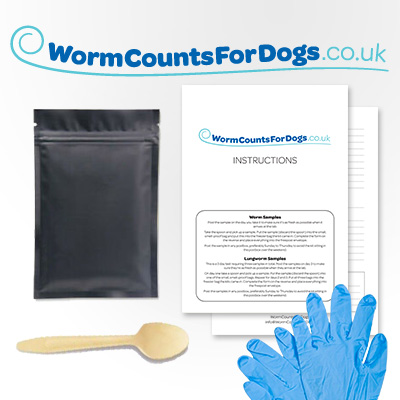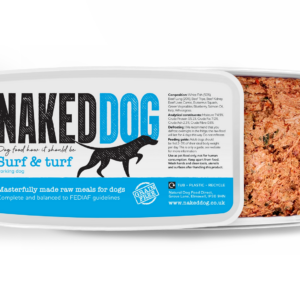Whether you worm conventionally, naturally, or not at all it’s a good idea to regularly test the worm burden of your dog to make sure they’re getting the protection they need and staying as healthy as possible.
Worm eggs and larvae are invisible to the naked eye. They’re found outside in water bowls, on toys, clinging to blades of grass, on snails and their trails, in dog poo, and dead animals.
Your dog swallows the worm eggs, they hatch in the intestine and the baby worms attach themselves to the lining of your dog’s gut. They then proceed to release millions of eggs which your dog passes out in their poo and the cycle continues. So if your dogs tests positive for eggs, they’ve definitely got worms.
This simple worm egg test will tell you if:
- Your dog has worms
- If your current wormer is working
- If you need to worm your dog or not
Test Kit: toxocara, tapeworm, whipworm, hookworm and giardia
Open the kit. Take a sample of your dog’s poo from that day using the small spoon provided. Put the sample into the smell proof bag, dispose of the spoon! Put the smell proof bag into the freezer bag the kit comes in. Fill out your details on the enclosed form and put the lot into the Freepost bag. Post as soon after collecting it as possible. Try to take the sample on Sunday to Thursday so the sample isn’t sitting in the post box for a couple of days.
The sample goes directly to the lab for testing. The results are emailed to you within 24/48 hours of receipt.
What’s in the kit:
- Full instructions
- Disposable gloves
- Collection spoon(s)
- Smell proof bag(s)
- Outer bag
- Freepost envelope
When to do a test
If you worm your dog: worm egg counts can be done any time from 14 days after worming. We don’t recommend doing a test before 14 days has elapsed as the worming treatment you have used will need those 14 days to work its magic.
If you don’t worm your dog: do a test any time, especially if you’re concerned worms may be present, or you live in, or have visited, a lungworm hotspot.
It is recommended you test for worms four times a year. This test is not intended as a replacement for worming your pet in the first place. It is merely a way of monitoring the worm egg burden of your dog and treating accordingly. Many owners choose to worm their pets while others never do, which is entirely your decision.
Worming puppies and kittens: Always worm puppies (and kittens) by following a veterinary flea and worming schedule as they will have inherited a parasite burden from their mother, and not to do so can pose a serious health risk to very young animals. If you have any questions do not hesitate in getting in touch.
£18.00






 Collect Points When You Buy.
Collect Points When You Buy.